闽教版小学英语六年级三大时态(一般现在时、一般过去时、一般将来时)表格对照与练习题
六年级四种时态总结
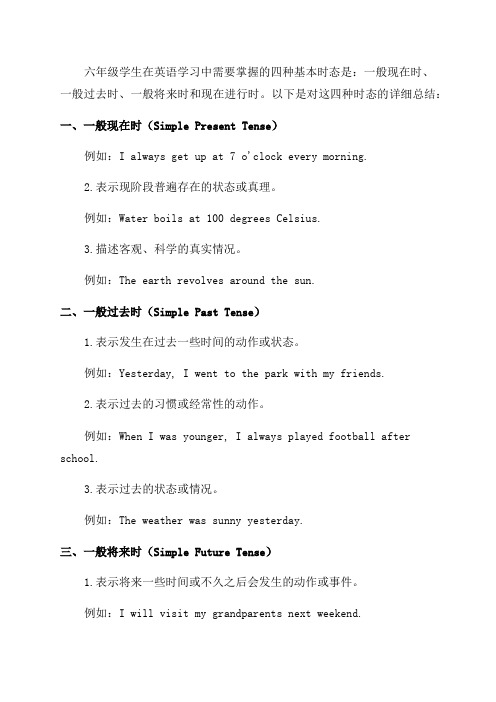
六年级学生在英语学习中需要掌握的四种基本时态是:一般现在时、一般过去时、一般将来时和现在进行时。
以下是对这四种时态的详细总结:一、一般现在时(Simple Present Tense)例如:I always get up at 7 o'clock every morning.2.表示现阶段普遍存在的状态或真理。
例如:Water boils at 100 degrees Celsius.3.描述客观、科学的真实情况。
例如:The earth revolves around the sun.二、一般过去时(Simple Past Tense)1.表示发生在过去一些时间的动作或状态。
例如:Yesterday, I went to the park with my friends.2.表示过去的习惯或经常性的动作。
例如:When I was younger, I always played football after school.3.表示过去的状态或情况。
例如:The weather was sunny yesterday.三、一般将来时(Simple Future Tense)1.表示将来一些时间或不久之后会发生的动作或事件。
例如:I will visit my grandparents next weekend.2.表示打算、计划或意图。
例如:I am going to study hard for the exam.3.表示预测、预言或非即刻发生的事情。
例如:It will rain tomorrow.四、现在进行时(Present Continuous Tense)1.表示现在正在进行的动作或状态。
例如:I am studying English now.2.表示临时的、目前的事情。
例如:She is staying at her friend's house this week.3.表示将来已确定的计划或安排。
(完整版)英语十六种时态表格(附准确例句)
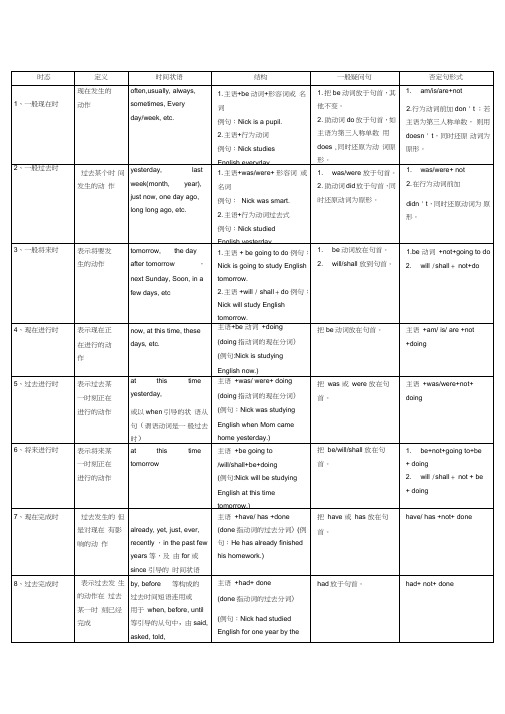
过去发生的 动作到现在 还在继续进 行
Since this morning,
Since I was five, etc.
主语+have/has+been+ doing
(例句:Nick has been studyingEnglish since
this morning.)
把have/has放在句首。
wouldhavestudied
English for three months by the end of this year.
N/A
Would+not
16、过去将来完
成进行时
表示从过去 某时刻看,到 未来某时刻 以前会一直 在进行的动 作
常用于宾语从句中
例句:He said that Nick wouldhavebeen
1.把be动词放于句首, 其他不变。
2.助动词do放于句首, 如主语为第三人称单数 用does,同时还原为动 词原形。
1.am/is/are+not
2.行为动词前加don't; 若主语为第三人称单数, 则用doesn't,同时还原 动词为原形。
2、一般过去时
过去某个时 间发生的动 作
yesterday,last
把be/will/shall放在句
首。
1.be+not+going to+be
+doing
2.will/shall+not+be
+doing
7、现在完成时
过去发生的 但是对现在 有影响的动 作
already, yet, just, ever, recently,in the past few years等,及由for或since引导的时间状语
闽教版小学英语全册语法知识
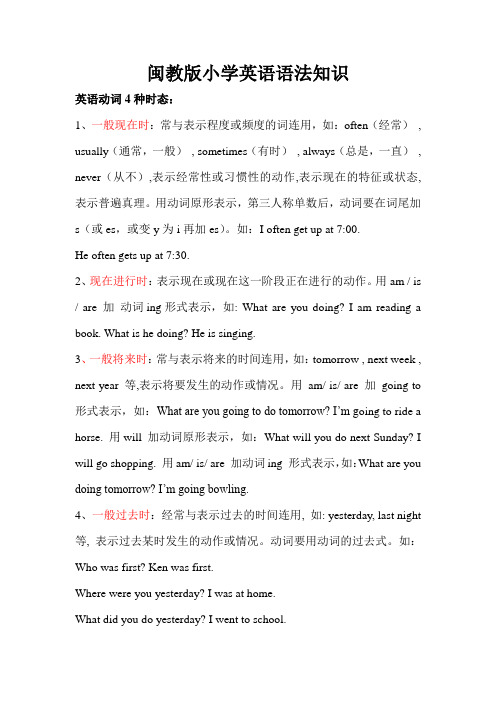
闽教版小学英语语法知识英语动词4种时态:1、一般现在时:常与表示程度或频度的词连用,如:often(经常), usually(通常,一般), sometimes(有时), always(总是,一直), never(从不),表示经常性或习惯性的动作,表示现在的特征或状态,表示普遍真理。
用动词原形表示,第三人称单数后,动词要在词尾加s(或es,或变y为i再加es)。
如:I often get up at 7:00.He often gets up at 7:30.2、现在进行时:表示现在或现在这一阶段正在进行的动作。
用am / is / are 加动词ing形式表示,如: What are you doing? I am reading a book. What is he doing? He is singing.3、一般将来时:常与表示将来的时间连用,如:tomorrow , next week , next year 等,表示将要发生的动作或情况。
用am/ is/ are 加going to 形式表示,如:What are you going to do tomorrow? I’m g oing to ride a horse. 用will 加动词原形表示,如:What will you do next Sunday? I will go shopping. 用am/ is/ are 加动词ing 形式表示,如:What are you doing tomorrow? I’m going bowling.4、一般过去时:经常与表示过去的时间连用, 如: yesterday, last night 等, 表示过去某时发生的动作或情况。
动词要用动词的过去式。
如:Who was first? Ken was first.Where were you yesterday? I was at home.What did you do yesterday? I went to school.形容词的比较级和最高级:1、单音节词:比较级加er, 最高级加est. 如:tall—taller—the tallest, He is taller than his brother. Tom is the tallest in his class.2、多音节词和部分双音节词:比较级加more, 最高级加the most. 如:interesting---------more interesting---------the most interesting,Music is interesting subject. P.E. is more interesting than music.. Science is the most interesting subject.形容词变为比较级的变化规则:(1)一般情况下,在形容词的词尾直接加er。
小学英语时态总结表格
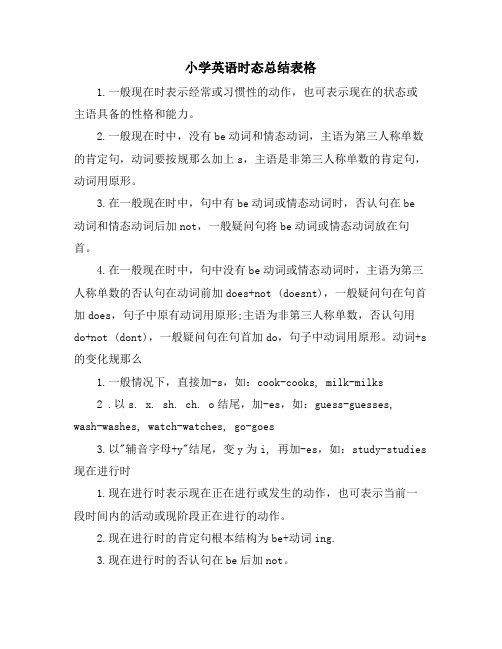
小学英语时态总结表格1.一般现在时表示经常或习惯性的动作,也可表示现在的状态或主语具备的性格和能力。
2.一般现在时中,没有be动词和情态动词,主语为第三人称单数的肯定句,动词要按规那么加上s,主语是非第三人称单数的肯定句,动词用原形。
3.在一般现在时中,句中有be动词或情态动词时,否认句在be动词和情态动词后加not,一般疑问句将be动词或情态动词放在句首。
4.在一般现在时中,句中没有be动词或情态动词时,主语为第三人称单数的否认句在动词前加does+not (doesnt),一般疑问句在句首加does,句子中原有动词用原形;主语为非第三人称单数,否认句用do+not (dont),一般疑问句在句首加do,句子中动词用原形。
动词+s 的变化规那么1.一般情况下,直接加-s,如:cook-cooks, milk-milks2 .以s. x. sh. ch. o结尾,加-es,如:guess-guesses,wash-washes, watch-watches, go-goes3.以"辅音字母+y"结尾,变y为i, 再加-es,如:study-studies 现在进行时1.现在进行时表示现在正在进行或发生的动作,也可表示当前一段时间内的活动或现阶段正在进行的动作。
2.现在进行时的肯定句根本结构为be+动词ing.3.现在进行时的否认句在be后加not。
4.现在进行时的一般疑问句把be动词调到句首。
动词加ing的变化规那么1.一般情况下,直接加ing,如:cook-cooking2.以不发音的e结尾,去e加ing,如:make-making, taste-tasting3.如果末尾是一个元音字母和一个辅音字母,双写末尾的辅音字母,再加ing,如:run-running, stop-stopping1.be going to 表示将要发生的事或打算、方案、决定要做的事情。
2.肯定句:be going to +动词原形,如:Jim is going to play football. 否认句:be not going to +动词原形,如:Jim is not going to play football. 一般疑问句:把be动词调到句首,如:Is Jim going to play football? 特殊疑问句:疑问词+be+主语+going to+动词原形?如:What is Jim going to do? 疑问词当主语时:疑问词+be+going to+动词原形?如:Who is going to play football?1.一般过去时表示过去某个时间发生的动作或存在的状态,常和表示过去的时间状语连用。
一般现在时一般过去时一般将来时汇总表格
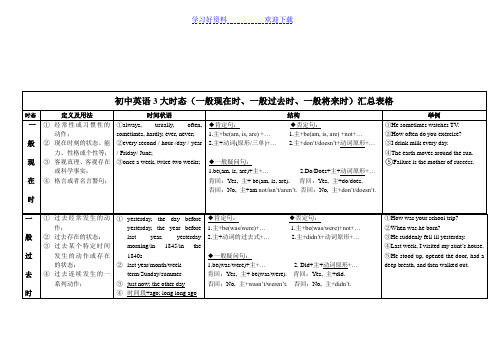
⑤He stood up, opened the door, had a deep breath, and then walked out.
时态
定义及用法
时间状语
结构
举例
一
般
将
来
时
一般将来时主要表示:
1将要发生的动作;
2将要存在的状态;
◆一般疑问句:ຫໍສະໝຸດ Will/Shall +主+动词原形+…?
肯回:Yes,主+will/shall.
否回:No,主+ won’t/shan’t.
2.be going to
◆肯定句:
主+be(am/is/are) +动词原形+…
◆否定句:
主+be(am/is/are)+ not+动词原形+…
◆一般疑问句:
----What are you doing for vacation.
----I’m going camping.
②every second / hour /day / year / Friday/ June;
③once a week, twice two weeks;
◆肯定句:◆否定句:
1.主+be(am, is, are) +…1.主+be(am, is, are) +not+…
2.主+动词(原形/三单)+…2.主+don’t/doesn’t+动词原形+…
3计划、打算做某事;
1.will/shall+动词原形
英语十六时态表格完整总结

英语十六时态表格完整总结英语十六时态表格总结(很全面)目录英语共有16种时态!常用的有12个:一般现在时、一般过去时、一般将来时、过去将来时、现在进行时、过去进行时、将来进行时、现在完成时、过去完成时、将来完成时、现在完成进行时和过去完成进行时。
其他时态很少单独使用!下面发部分英语时态表吧!希望能对你们有帮助!一般现在时、一般过去时一般将来时、过去将来时现在进行时、过去进行时现在完成时、过去完成时英语时态表—英语时态举例!详细讲解-一般现在时详细讲解-现在进行时、一般过去时现在进行时一般过去时详细讲解-过去进行时、过去完成时、过去进行时由助动词be 的过去式+现在分词构成。
其中be有人称和数的变化,第一、第三人称单数用was,其他用were.1)过去进行时动词主要表示在过去某一时刻或某一段时间内正在进行或持续进行的动作。
过去进行时经常与过去时配合使用。
例如:This time yesterday, we were having an English lesson. 昨天这个时候,我们正在上英语课。
The teacher was giving us a lesson when Tom walked into the room.老师在给我们上课时,汤姆走进教室。
While we were having supper, all the lights went out. 我们吃饭的时候,灯灭了。
He was reading while she was setting the table. 她摆桌子时,他在读书。
It was getting dark. The wind was rising. 天渐渐黑下来了。
风势增强了。
2)过去进行时动词常用always, continually, frequently 等词连用,表示过去经常发生的行为。
这种用法表明带有的感情色彩。
例如:The two brothers were frequently quarreling when they were young. 两兄弟小时候常吵架。
(完整版)一般现在时、一般过去时、一般将来时、现在进行时
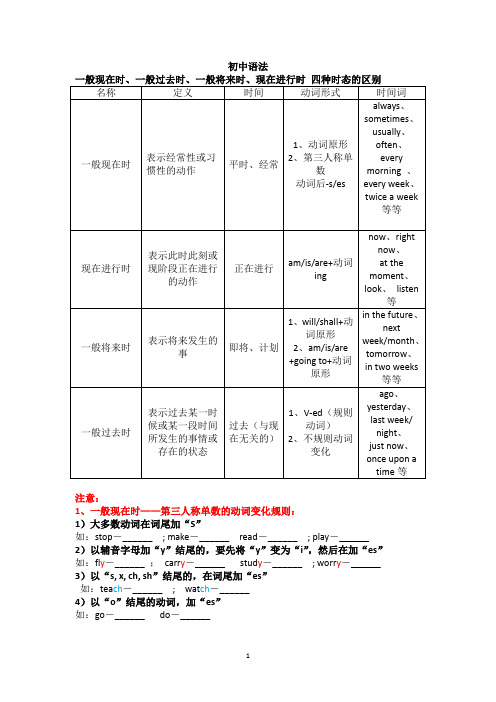
初中语法注意:1、一般现在时——第三人称单数的动词变化规则:1)大多数动词在词尾加“S”如:stop-______ ; make-______ read-______ ; play-______ 2)以辅音字母加“y”结尾的,要先将“y”变为“i”,然后在加“es”如:fl y-______ ;carr y-______ stud y-______ ; worr y-______ 3)以“s, x, ch, sh”结尾的,在词尾加“es”如:tea ch-______ ; wat ch-______4)以“o”结尾的动词,加“es”如:go-______ do-______2、现在进行时——动词ing形式的变化规则1.一般动词直接在词尾+ing例:read→______ (读)talk→______(交谈)sing→______(唱歌)2.以不发音e结尾的动词,先去e再加ing例:lik e→______喜欢writ e→______写skat e→______(滑冰)3.以重读闭音节结尾且末尾只有一个辅音字母的动词,双写末尾字母,再加ing 例:sto p→______(停止)ge t→______(得到)4.少数几个以ie结尾的动词,变ie为f再加ing。
例:l ie→______(躺、撒谎)t ie→______(系、捆绑)3、一般过去时——动词的变化规则(1) 一般在动词后加-ed。
如:play-______, offer-______, weigh-______, destroy-______, sign-______(2) 在以字母e结尾的动词后,只加-d。
如:lik e-______, provid e-______, hat e- ______ dat e-______(3) 在以“辅音字母+y”结尾的动词后,则改y为i,再加-ed。
如:suppl y-______, stud y- ______.(4) 在以单短元音的重读闭音节结尾且,末尾只有一个辅音字母的动词后,双写最后一个辅音字母,再加-ed。
一般现在时、现在进行时、一般将来时、一般过去时四大时态讲解表格对比总结教学文稿
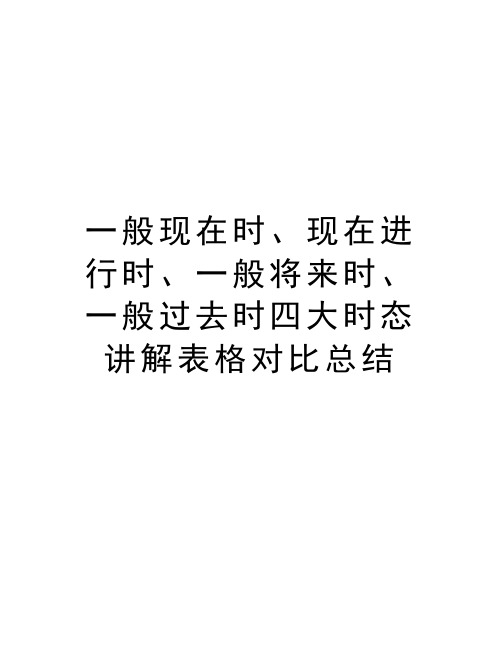
一般现在时、现在进行时、一般将来时、一般过去时四大时态讲解表格对比总结四大时态总结--------一般现在时、一般将来时、一般过去时、现在进行时一、一般现在时一般现在时表示经常性或习惯性的动作,常与表示频度的时间状语连用,如often, usually, always, sometimes, never, seldom, every week/day/year/month..., once a week, on Sundays等。
动词用原形。
当主语第三人称单数的动词变化规则:(只有在第三人称(he, she, it, 一个人名)为主语的肯定句中,动词才用三单式)(1)一般情况下,直接加s runs gets likes(2)结尾是s, x, sh, ch, o,前为辅音字母,结尾加es watches, goes, washes, crosses, mixes, does(3)动词末尾y,前为辅音,将y改为i加es study→studies fly→flies但在y前如果为元音则直接加s buys says plays(4)不规则变形 have—has二、现在进行时现在进行时表示此时此刻或现阶段正在进行的动作。
常与now, at this time, these days, Listen! Look! at(1)直接在动词后加ing. going, starting, working.(2)去掉词尾不发音的e,再加ing. leave--leaving, make---making.注意:如果单词结尾的e发音,则不能去掉,也直接加ing. see –seeing agree - agreeing .(3) 对于动词只有一个元音,而其后跟了一个辅音字母时,双写末尾辅音字母再加ing.sitting, beginning run – running stop – stopping cut – cutting control – controlling(4)以ie结尾,把ie变y再加ing。
- 1、下载文档前请自行甄别文档内容的完整性,平台不提供额外的编辑、内容补充、找答案等附加服务。
- 2、"仅部分预览"的文档,不可在线预览部分如存在完整性等问题,可反馈申请退款(可完整预览的文档不适用该条件!)。
- 3、如文档侵犯您的权益,请联系客服反馈,我们会尽快为您处理(人工客服工作时间:9:00-18:30)。
闽教版小学英语六年级英语三大时态(一般现在时、一般过去时、一般将来时)
时态定义及
用法
时间状语结构举例
一般现在时经常性
或习惯
性的动
作
①always,usually,often
,
②every hour /day /
year / Friday/ June;
◆肯定句:
主+动词(原形/三单)+
◆否定句:
主+don’t/doesn’t+动词原形
+…
◆一般疑问句:
.Do/Does+主+动词原形+…
①He often plays chess.
②He doesn’t play chess.
③Does he often play chess?
④What does Sally do in the
summer vacation?
一般过去时过去经
常发生
的动作;
①yesterday,
②last+时间
last year/month
③just now;
④时间段+ago;
two days ago
◆肯定句:
主+动词的过去式+…
◆否定句:
.主+didn’t+动词原形+…
◆一般疑问句:
Did+主+动词原形+…
①He played chess yesterday.
②He didn’t play chess yesterday.
③Did he play chess yesterday?
④What did Sally do in the
summer vacation?
一般将来
时将要发
生的动
作;
①tomorrow+
Tomorrow
morning/afternoon
②next +时间
next week/year/Friday
1.will
◆肯定句:
主+will+动词原形+…
◆否定句:
主+will + not+动词原形+…
◆一般疑问句:
Will + 主+动词原形+…?
①He will play chess tomorrow.
②He will not play chess
tomorrow.
③Will he play chess tomorrow?
④What will Sally do in the
summer vacation?
一、选择题
( ) 1.Ben usually at 6:40. A.got up B.get up C.gets up ( ) 2.In the past my mother my bed. A.make B.made C.makes ( ) 3.Where you in the summer vacation?
A.are
B.is
C.were
( ) 4.Did you a good time in the USA?
A.have; Yes,I did
B.had; Yes,I did
C.have; No,I don’t
( ) 5.Do you often do housework at home?
A.Yes,I does.
B.No,I don’t.
C.Yes,I am.
( ) 6.Does he clean his room now?
A.Yes,she does.
B.Yes,he does.
C.No,he don’t.
( ) 7.li Hong usually at 6:30 in the morning.
But this morning she at 7:00.
A. get;got
B. gets;get
C.gets;got
( ) 8. How Mike go to school every day?
A.do
B.is
C.does
D.are
( ) 9. The students the football match now.
A.watch
B.to watch
C.are watching
D.watching
( ) 10. Did you your room yesterday?
A.clean
B.cleans
C. cleaned
D.cleaning
二、填空题
1.Listen,there are many students (sing)in the classroom.
2.. Look! Sarah is (dance).
3. My mother often (wash)clothes on the weekends.
4. He (buy) a present for his mother yesterday.
5. John (visit)Qingdao next Sunday.
6.He usually____(go) to school on foot.
7.Does she_____(go) to school on foot?
8.Did she ____(go) to school on foot?
9.They_____(go) to school on foot yesterday.
10.____ she going to school on foot?
助动词do,does,did或者它们的否定形式的使用
1) you like this magazine?
2) The girl like bread for breakfast.
3) ---What she at the weekends?
---She usually plays games with her friends.
4) ---What you do last Sunday? ---I wrote to my friend.
5) -- He not visit a farm last National Day holiday.
6) They not like playing volleyball.
7) --- Jim have a picnic with his family every Saturday?
---Yes, he
8) Helen with Yang Ling go to school by bike every day?
9) [Do/Does]______ you go to school everyday? No, I don’t. 10) [Do/Does]______ Jack and Peter like apples?
11)[Do/Does]______ he watch TV at night? Yes he does. 三.连词成句(请注意大小写)
1. the summer you where were in vacation
2.did do yesterday what you
A good did have time the you in a
4. Wang Tao his yesterday did make bed?
5. does often housework home Sally at do
6.will where you for the go holidays
7. to bookstore yesterday he went the.。
